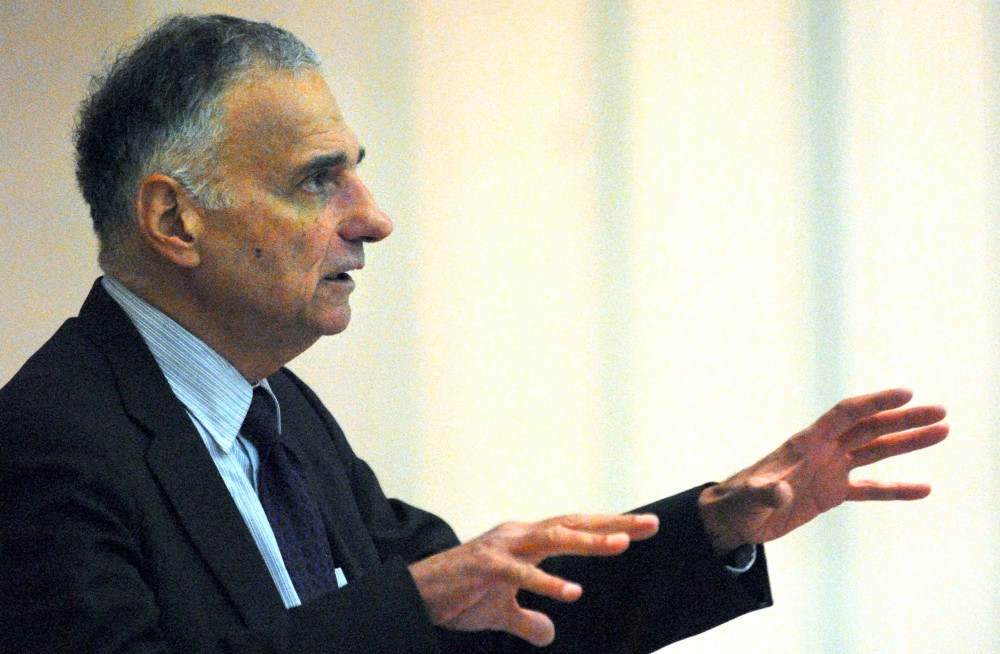The two major political parties are engaged in “trick-or-cheat” politics, Independent presidential candidate Ralph Nader said at a campaign stop on campus Halloween night. Nader, who is on the ballot in 45 states including Minnesota, took aim at both Republicans and Democrats in his almost hour-long speech, saying the country would not change until a third party could affect politics. Throughout the speech, Nader called on the roughly 300 people in attendance at Willey Hall to consider, âÄúWhat more do they have to do to lose our vote?âÄù âÄúWe’re caught in a prison, letâÄôs face it,” he told the crowd. Nader spoke most frequently about universal health care and business policy in his speech. He also called for an end to the war in Iraq, calling President Bush a âÄúbaby taxerâÄù for financing the war despite the national debt. Nader also had harsh words for Democratic presidential nominee Barack Obama , questioning his White House run. âÄúWhat is it?âÄù Nader asked. âÄúIs it just an unprecedented upward career move?âÄù Carl Carpenter , a strategic communications and political science junior, attended NaderâÄôs speech despite the fact he supports Obama. Carpenter, who sported an Obama T-shirt and held up a campaign sign at times during the speech, said he went to see Nader because of his political prominence. âÄúI think that what he represents most to people is the understanding that the two-party system is flawed and that a lot of views are unrepresented,âÄù he said. Nader has run in every presidential election since 1996, even garnering about 2.75 percent of the national vote in 2000. Steven Rosenstone , political science professor and Vice President for scholarly and cultural affairs, said Nader plays a very small role in this election. Most third-party candidates affect policy more than they do the election results, Rosenstone said, as the winning party adapts the policies promoted by the third parties to snatch their votes in the next election. Rosenstone brought up third party candidates such as George Wallace in 1968 and Ross Perot in 1992 as candidates who may have affected the policies of the victors. But does Nader have the same appeal? âÄúRalph Nader is not a Ross Perot and he is not a George Wallace,âÄù Rosenstone said. Nader said he is not running this year to win the election, but rather because he wants to send a message to the major parties. “When they see a third political force emerge and grow in the future, it restrains them from some of the things they are doing,” Nader said. By his campaignâÄôs own account, Nader is only polling at 5 to 6 percent nationwide. Even some attending the rally, like sophomore Connor Drummon d, said they donâÄôt expect Nader to win. âÄúItâÄôs a great way for people to come together and organize,âÄù he said, âÄúto try to figure out what weâÄôre going to do after the elections and how to take this energy and move forward.âÄù Karla Schulz , campus coordinator for the Nader campaign, said she supports Nader because she thinks heâÄôs the best candidate, even if others have misconceptions about him. âÄúA lot of people make it seem like Nader is a crazy person,âÄù she said. Nader contended he is the candidate most able to represent the average voter, and used the words of a supporter in New York to back up his claim. âÄúHe said, âÄòIâÄôm voting for myself, which is why IâÄôm voting for you, Mr. Nader,âÄô âÄù he said.

Image by Jennifer Whalen
fe1009
Nader decries two-party system at U event
Published November 2, 2008
0
More to Discover






